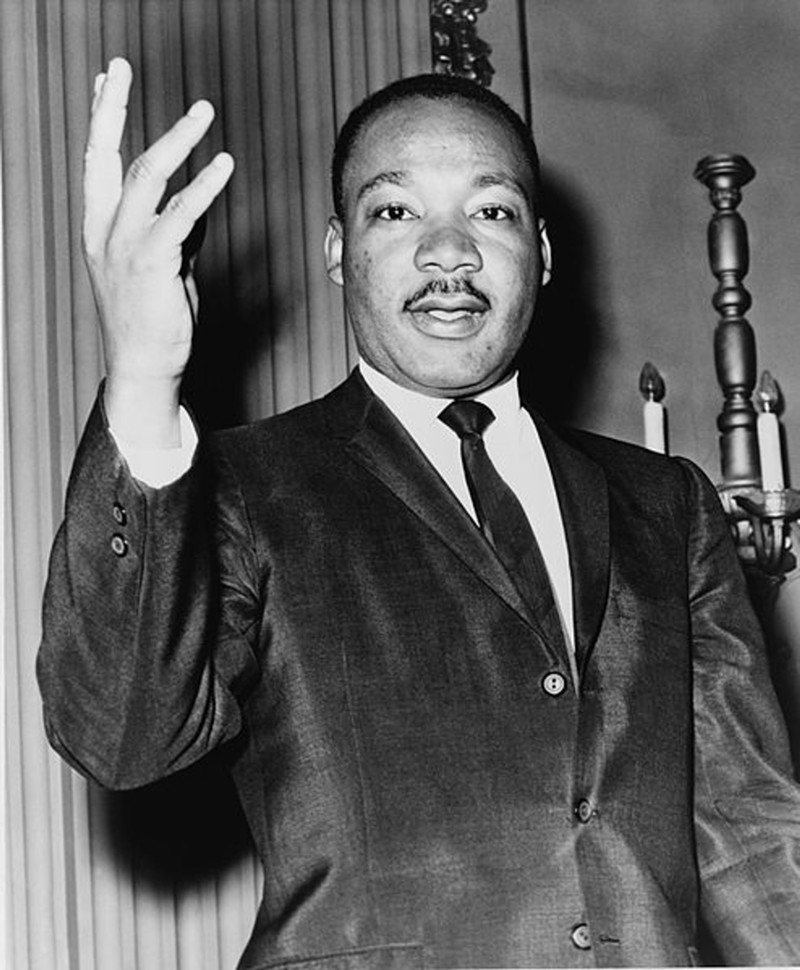If his speeches and other comments are any indication, Martin Luther King Jr. would likely stand in sharp opposition to modern Ohio Republicans and many of their proposed policies.
In reviewing King’s work, speeches and quotes, it’s clear he was a progressive on a wide range of issues — from voting rights to collective bargaining rights to reproductive rights. In contrast, modern Republicans are doing their best to dilute such rights and scale back progressive causes on a host of other issues.
Given that it’s Martin Luther King Jr. Day, what better time to look back at some of King’s positions and analyze what they could mean in terms of today’s politics? Warning: The results might upset some Republicans.
On voting rights:
“So long as I do not firmly and irrevocably possess the right to vote, I do not possess myself,” King said, according to PBS. “I cannot make up my mind — it is made up for me. I cannot live as a democratic citizen, observing the laws I have helped to enact — I can only submit to the edict of others.”
King and other civil rights activists saw the right to vote as the most crucial stepping stone to equality. In fact, one of the defining accomplishments of the Civil Rights Movement was the Voting Rights Act of 1965, which attempted to ban discrimination in the voting booth.
“Give us the ballot and we will transform the salient misdeeds of blood-thirsty mobs into calculated good deeds of orderly citizens,” King said.
More specifically, the Voting Rights Act helped undo several voting restrictions taken up against minority voters in the South. The restrictions rarely outright banned black voters; instead, Southerners took up backhanded standards, such as literacy tests and poll taxes, that many black voters couldn’t meet.
If that sounds familiar, it’s because, by at least one top Ohio Republican’s admission, growing restrictions on early voting also help curtail black voters — who, by the way, happen to vote for Democrats in droves.
“I guess I really actually feel we shouldn’t contort the voting process to accommodate the urban — read African-American — voter-turnout machine,” said Doug Preisse, chairman of the Franklin County Republican Party and close adviser to Gov. John Kasich, in an email to The Columbus Dispatch.
In other states, Republicans are taking similarly restrictive approaches and passing stringent voter ID laws, even though one study found it discriminates against young, minority voters.
Especially given Preisse’s comments, it’s clear King would not approve of Republican actions. King saw enough oppression in Southern voting booths to know better.
On labor unions and “right to work”:
“In our glorious fight for civil rights, we must guard against being fooled by false slogans, such as ‘right to work.’ It is a law to rob us of our civil rights and job rights. Its purpose is to destroy labor unions and the freedom of collective bargaining by which unions have improved wages and working conditions of everyone,” King said, according to the Economic Policy Institute. “Wherever these laws have been passed, wages are lower, job opportunities are fewer and there are no civil rights. We do not intend to let them do this to us. We demand this fraud be stopped. Our weapon is our vote.”
In this statement, King unequivocally disavows restrictions on unions and collective bargaining rights.
Meanwhile, Gov. Kasich and top Ohio Republicans remain mum on whether they support anti-union laws like “right to work,” much to the chagrin of tea party groups that strongly support such efforts.
But it’s clear Kasich and Ohio Republicans support some restrictions on unions and collective bargaining. In 2011, the Republican-controlled legislature and governor approved Senate Bill 5, a bill that significantly curtailed public unions and their collective bargaining rights.
Almost immediately, labor unions rallied in opposition to the effort and took the issue to referendum. Voters overwhelmingly rejected S.B. 5 the following November, dealing a major blow to Republicans and a huge political boost to unions and Democrats.
Despite the rejection, some conservatives continue pushing anti-union causes. The tea party-backed group Ohioans for Workplace Freedom aims to get an anti-union “right to work” initiative on the ballot in 2014.
Considering King’s strong pro-union statements, it’s clear he would stand against Ohio Republicans’ and the tea party’s anti-union efforts if he lived today.
On the death penalty:
“I do not think God approves the death penalty for any crime — rape and murder included,” King said, according to Stanford University. “Capital punishment is against the best judgment of modern criminology and, above all, against the highest expression of love in the nature of God.”
King’s comment clearly disavows the death penalty, even for the gravest crimes, based on his religious perspective and study of criminology.
Perhaps more than any other issue on this list, King’s stance on the death penalty could upset some Democrats as much as some Republicans. But even though support for the death penalty crosses partisan lines, it’s much more pronounced on the Republican side of the spectrum.
In recent days, the debate over the death penalty reignited in Ohio after Gov. Kasich’s administration took 26 minutes to execute a gasping, grunting convicted killer with a new cocktail of drugs that was never tried before in the United States.
The prolonged execution, the longest since Ohio resumed use of the death penalty in 1999, led some legislative Democrats to push new limits or even an outright ban on capital punishment. It’s expected the Republican majority will ignore the bills.
Based on his claims, King would oppose the state-sanctioned killing of a convicted killer, and he certainly would reject any defense that touts vengeance as a justification for killing another human being.
On health care:
“Of all the forms of inequality, injustice in health care is the most shocking and inhuman,” King said, according to Dr. Quentin Young, who attended King’s speech at the 1966 convention of the Medical Committee for Human Rights.
Whether King’s quote indicates support for Democrat-backed legislation like Obamacare or other measures, such as a single-payer system, is completely unclear. But King’s rhetoric certainly comes closer to Democrats’ support for universal access to health care than Republicans’ opposition to governmental incursions into the U.S. health care system.
To Gov. Kasich’s credit, he helped alleviate the “inequality” and “injustice in health care” King referred to by aggressively pursuing the federally funded Medicaid expansion.
But Kasich was in the minority of the Ohio Republican Party in his pursuit. The state legislature’s Republican majority refused to approve the Medicaid expansion in the two-year state budget and later bills. When Kasich finally got the Medicaid expansion done through the seven-member Controlling Board, several legislative Republicans joined an unsuccessful lawsuit to reverse the decision.
Accordingly, King would probably praise Kasich for opening up access to health care, and it’s doubtful he would support Republicans in their attempts to block health care for the poor.
On reproductive rights:
“For the Negro, therefore, intelligent guides of family planning are a profoundly important ingredient in his quest for security and a decent life,” King said, according to Planned Parenthood. “There are mountainous obstacles still separating Negroes from a normal existence. Yet one element in stabilizing his life would be an understanding of and easy access to the means to develop a family related in size to his community environment and to the income potential he can command.”
King’s comments on reproductive rights came as he accepted the first round of the Margaret Sanger Awards from Planned Parenthood, an organization now demonized by Republicans for its support for abortion and reproductive rights.
Now, nothing in King’s comments implies he supported abortion rights, even though some historians believe King, a strong Christian, accepted a more liberal interpretation of the Bible.
But King’s comments — and even his mere acceptance of the Planned Parenthood award — show strong support for reproductive rights for low-income men and women. In that respect, King is clearly going against Ohio Republicans’ pursuits.
In the 2014-2015 state budget, a Republican majority passed new funding restrictions on Planned Parenthood and other comprehensive family planning centers. Some of the restrictions hit family planning clinics that don’t offer abortions.
Even though King’s stance on abortion is unclear, his comments clearly contradict efforts to restrict access to family planning clinics and reproductive rights. Once again, he would not approve of the Republican agenda.






